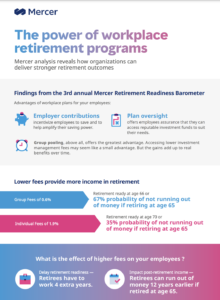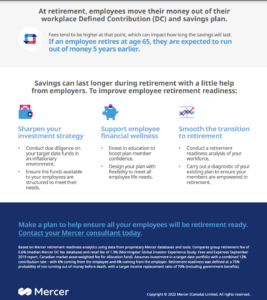 By Jillian Kennedy, Mercer Canada
By Jillian Kennedy, Mercer Canada
Special to the Financial Independence Hub
If someone said you could have four extra years to enjoy your retirement, you’d probably be thrilled. Now imagine being forced to hold off on retirement for four years longer than you planned.
As it turns out, a gap in investment management fees can potentially make that a reality for many Canadians – but there is a fix.
Our newly released 2022 Mercer Retirement Readiness Barometer analyzed the various investment management fees in the market and their impact on retirement readiness. What we found is that someone paying the median level of fees for an individual investment account – 1.9% – would have to wait until age 70 to be retirement ready. Obviously, that’s well past the traditional retirement age target of 65 that many of us have in our sights.
 It’s a different story if you consider the benefits of a workplace defined contribution (DC) plan. An individual paying 0.6% in fees – the median for a DC savings plan – would be ready for retirement four years sooner, at age 66. (The analysis assumed individuals are invested in a “balanced” target date portfolio with a 12% combined contribution rate – with 6% coming from the employee and 6% from the employer).
It’s a different story if you consider the benefits of a workplace defined contribution (DC) plan. An individual paying 0.6% in fees – the median for a DC savings plan – would be ready for retirement four years sooner, at age 66. (The analysis assumed individuals are invested in a “balanced” target date portfolio with a 12% combined contribution rate – with 6% coming from the employee and 6% from the employer).
Those who have access to a workplace DC and savings plan can benefit from pooling power and lower fees in a group arrangement. Personal finance experts have commented for years on this fee disparity between group workplace plans and other investment savings vehicles, but this analysis puts that into clear perspective. Consider not only shaving years off your working life but having a better quality of life in the retirement years that follow.
The fee gap’s impact before – and after – retirement
This gap in fees doesn’t only affect the savings phase, but also the period after someone begins to draw from their retirement savings. It’s common to move retirement savings from a workplace plan into an individual account and at that point, higher fees tend to kick in.
Take, for example, an individual retiring at 65. Our analysis shows that if that person pays the median retail fee (1.9%) when they begin drawing money from their individual retirement savings account, they’ll run out of money five years earlier compared to someone paying the median group fee of 0.6%.
If someone is paying the median group fee (0.6%) throughout their career, on the other hand, then retires at age 65 and subsequently invests their nest egg in an account paying that same rate, they will have an average of 12 more years of retirement income compared to a similar person paying the median retail fee (1.9%) over the same period.
Group pooling is a powerful tool
Of course, successful retirement income planning takes a comprehensive approach including workplace savings programs, government benefits and personal savings. Higher contribution levels and a smart investment strategy also play an important role, as does money management post-retirement. Continue Reading…





